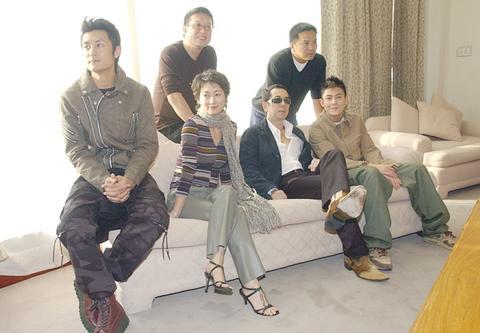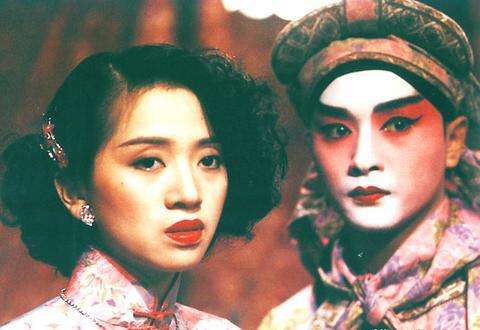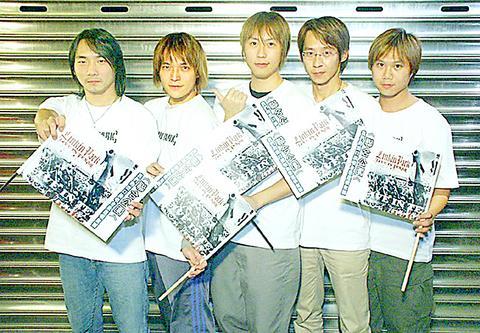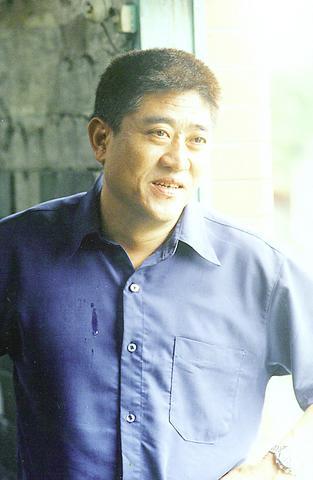In movies, TV and music, last year was characterized by only a few innovations and too many tragedies. There were some bright moments, for sure, but even these only seemed great against the gloomy background of sad news and pop-culture industries in general decline.
Below, Pop Stop revisits the good, the bad and the ugly stories that kept Chinese pop culture chugging along last year.
1) Taiwan Thunderbolt Fire (

PHOTO: TAIPEI TIMES
2) Hong Kong's movie industry kept its stride with the star-studded trilogy Infernal Affairs(
3) On April 1, one of Hong Kong's brightest stars, Leslie Cheung (
4) Another sad event came when Taiwan's own Evel Knievel and adored actor and singer Ke Shou-liang (

PHOTO: TAIPEI TIMES
5) Mayday (
6) Taiwan saw the underground release of its first hard-core porno, called Taiwan Plumber (
7) The black metal band Chthonic (

PHOTO: TAIPEI TIMES
8) Tsai Ming-liang's (蔡明亮) protegee, Lee Kang-sheng (李康生) came perilously close this fall to parodying his and his mentor's filmmaking style in an advertisement he made for Family Mart (全家便利商店) that featured the cast of Goodbye, Dragon Inn (不散) and The Missing (不見) moping about in the convenience store contemplating their beverage purchases in tiresome longshots.
9) If imitation is the best form of flattery, then Next Magazine (壹週刊) can take some pride in its invented term -- "doing the splits" -- (劈腿), used to describe someone who is two-timing their significant other. It become common usage in all the major Chinese-language papers after exposing Hsu Shao-yang (許紹洋) as the on-the-side lover of Lin Wei-jun (林韋君), who was the girlfriend of pop singer Lin You-wei (林佑威). Subsequently, affairs in all the major media have been referred to as a "splits event"
(

PHOTOS: TAIPEI TIMES
10) And finally, another of Hong Kong's pop legends, Anita Mui (

Towering high above Taiwan’s capital city at 508 meters, Taipei 101 dominates the skyline. The earthquake-proof skyscraper of steel and glass has captured the imagination of professional rock climber Alex Honnold for more than a decade. Tomorrow morning, he will climb it in his signature free solo style — without ropes or protective equipment. And Netflix will broadcast it — live. The event’s announcement has drawn both excitement and trepidation, as well as some concerns over the ethical implications of attempting such a high-risk endeavor on live broadcast. Many have questioned Honnold’s desire to continues his free-solo climbs now that he’s a

As Taiwan’s second most populous city, Taichung looms large in the electoral map. Taiwanese political commentators describe it — along with neighboring Changhua County — as Taiwan’s “swing states” (搖擺州), which is a curious direct borrowing from American election terminology. In the early post-Martial Law era, Taichung was referred to as a “desert of democracy” because while the Democratic Progressive Party (DPP) was winning elections in the north and south, Taichung remained staunchly loyal to the Chinese Nationalist Party (KMT). That changed over time, but in both Changhua and Taichung, the DPP still suffers from a “one-term curse,” with the

Jan. 26 to Feb. 1 Nearly 90 years after it was last recorded, the Basay language was taught in a classroom for the first time in September last year. Over the following three months, students learned its sounds along with the customs and folktales of the Ketagalan people, who once spoke it across northern Taiwan. Although each Ketagalan settlement had its own language, Basay functioned as a common trade language. By the late 19th century, it had largely fallen out of daily use as speakers shifted to Hoklo (commonly known as Taiwanese), surviving only in fragments remembered by the elderly. In

William Liu (劉家君) moved to Kaohsiung from Nantou to live with his boyfriend Reg Hong (洪嘉佑). “In Nantou, people do not support gay rights at all and never even talk about it. Living here made me optimistic and made me realize how much I can express myself,” Liu tells the Taipei Times. Hong and his friend Cony Hsieh (謝昀希) are both active in several LGBT groups and organizations in Kaohsiung. They were among the people behind the city’s 16th Pride event in November last year, which gathered over 35,000 people. Along with others, they clearly see Kaohsiung as the nexus of LGBT rights.